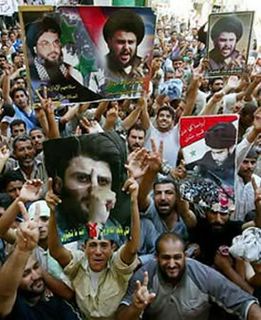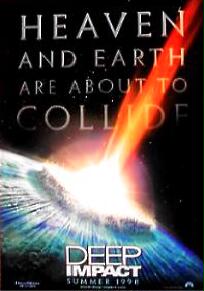New York. The entirety of Iraq included on list of endangered monuments. The World Monument Fund, based in New York, reports that hundreds of ancient monuments in Iraq are in peril. Organization President Bonnie Burnham says the entire cultural inheritance of the country is threatened.
Amman. Al-Arabiya reporter wounded in an attempted kidnapping has been transferred to a Jordanian hospital in critical condition. Jawad Kazem, 37, is partially paralyzed. Al-Arabiya had complained that US military authorities prevented an earlier evacuation of Mr. Kazem.
Brussels. Iraq pleads its case. Leaders and ministers from 85 nations and organizations converged on Brussels for an international conference on Iraq sponsored by the United States and the European Union. Meanwhile European diplomats caution that the conference is not meant to produce "grand new initiatives."
London. Latest casualty figures for Iraq. United States military: 1,722; Britain: 88; other nations 93. Iraqi military: 6,370; civilians 25,341.
Balad. A truck driver was shot dead as he exited a US military base.
Balad. Iraqi man killed as he was placing a roadside bomb.
Baïji. Clash between armed men and police kills two police and two civilians.
Shomeli. The corpse of an Iraqi civilian kidnapped three days ago was recovered.
Shorgat. Iraqi troops find the bodies of a businessman and an Iraqi soldier.
Bohruz. 40 alleged al-Qaeda members arrested. Weapons were also confiscated.
Moualha. 30 alleged al-Qaeda members arrested by Iraqi forces.
Baghdad. Security forces arrest al-Zarqawi lieutenant Hussein Alewi Khalil Ibrahim, aka Abu Ali.
Baquba. A policeman was shot dead in Baquba while going to work.
Rutbah A roadside bomb killed a U.S. soldier on patrol west of Rutbah, about 355 kilometers (220 miles) west of Baghdad and the road to neighboring Jordan, the military said. The soldier was assigned to 1st Corps Support Command.
23:58 A Turkish contractor was kidnapped and his captors demand that Ankara terminat all supply contracts with the US military.
23:04 Baghdad. Al Zarqawi has claimed credit for yesterday's suicide bombing in Arbil which killed 13.
23:03 Quito. Equatorian police claim that they dismantled a drug ring operating in Ecuador, Colombia, Brazil and the United States financed by Hezbollah. [Do you think this deserves a guffaw?--Nur] Colonel Edison Ramos, chief of the anti-drug squad, insisted that Hezbollah received 70% of receipts and that most of the 19 persons arrested were Syrian or Lebanese. The police operation, dubbed Operation Damascus, was initiated in 2004, claims to have acquired "proof" of a direct link to the "criminal Hezbollah organization. The ring's kingpin, Rady Zaiter, a Lebanese living in Equator, was arrested last week in Bogota. The French government has requested his extradition.
22:55 Washington. White House spokesman Scott McClellan said the assassinations of Hariri, Qassir and Hawi were
targeted assassinations with the intent of intimidating the Lebanese and undermining progress towards a democratic future. McClellan repeated the charge that Syria was directly involved.
22:30 Beirut. Communist Party leader Khaled Hadad blamed Lebanese intelligence agents in the pay of Syria for the assassination of George Hawi. Meanwhile, the interim government of Najeeb Miqati resigned today to make way for the new Lebanese government.
22:21 Baghdad. Tariq Aziz testified before the Iraqi Special Tribunal today. His lawyer, Badee Izzat Aref, says Aziz rejected all charges against him.
22:19 Baghdad. The French Embassy claims to have no information on the reasons for the explusion of French reporter Anne-Sophie Le Mauff by the Iraqi authorities.
21:34 Rome. Remains of Salvatore Santoro returned to Italy. The body of British resident and Italian national Salvatore Santoro, killed in Iraqi in December, have arrived in Rome from Vienna. The body will undergo a forensic examination.
20:06 Jerusalem. Today's summit between Israeli Prime Minister Ariel Sharon and Palestinian President Mahmoud Abbas achieved no progress in facilitating the Israeli pullout from the Gaza Strip or in advancing the peace process.
It was a troubled meeting which did not meet our expectations, said Palestinian Premier Ahmed Qoreï, who attended the meeting at Sharon's residence.
There was no positive reply to any of our proposals, said Qoreï, citing the reopenig of the Gaza airport, the release of 8,000 Palestinian prisoners held in Israel and the expansion of Jewish settlements on the West Bank. The meeting lasted an hour and a half and there was no handshake or communiqué. Impatient with Abbas' refusal to disarm Palestinian militants, Israeli troops arrested 52 Palestinians prior to the summit. Meanwhile, Sharon told Secretary of State Condoleezza Rice that any progress on the Road Map is conditioned upon the disarming of Palestinian radicals and "calm". However, Abbas hopes to involve the radicals in the political process and to integrate armed factions into Palestine's regular security forces.
20:16 Beirut. Thousands of people jammed the streets around the site of the assassination of George Hawi waving Communist and Lebanese banners and portraits of Hawi and Rafik Hariri. The protesters blamed Syria and Lebanese President Lahoud for the assassination.
19:51 Baghdad. French reporter expelled. The French Foreign Minister says reporter Anne-Sophie Le Mauff was expelled by the Iraqi authorities. Anne-Sophie Le Mauff reported in her 13 June dispatch to
L'Humanité that the French Ambassador to Baghdad, Bernard Bajolet, asked her to leave Iraq for her own safety.
19:49 Rome. A lawyer for Saddam Hussein, Giovanni di Stefano, says that according to the current Iraqi Constitution, accepted by the United Nations, the Iraqi President enjoys judicial immunity.
19:34 Baghdad. Swedish hostage released. Ulf Hjertström, 63, a resident of Iraq for 14 years working in the petroleum sector, told a Swedish tabliod,
Aftonbladet, that he was kidnapped on 25 March and held until 30 May. A ransom of 250,000 kroner was demanded by never paid. Hjertström said he was held with an Australian hostage
19:31 Brussels. US Secretary of State Condoleezza Rice said she did not expect any agreement on reducing Iraq's debt. US sources say that former dictator Saddam Hussein had accumulated a foreign debt of $110 billion.
19:22 Washington. The White House demands investigation into the death of Georges Hawi. Meanwhile Condoleezza Rice accused Damascus of indirect involvment in the assassination.
18:52 Ramallah. Palestinian Prime Minister Ahmad Qoreï stated that the result of today's summit between President Mahmoud Abbas and Israeli Premier Ariel Sharon is unsatisfactory.
18:43 Baghdad. Water purification plant sabotaged by RPG fire; Baghdad without potable water. The west bank of the capital is without water since Sunday as temperatures climb. The Taji pumping station was sabotaged by the guerrillas. Repairs are underway and the water supply is expected to resume tomorrow. Meanwhile many residents have moved in with friends and relatives on the east bank of the Tigris. Water trucks are supplying Yarmouk Hospital. Only 65% of residents are supplied with power and water on a regular basis.
18:37 Jerusalem. Israeli Premier Ariel Sharon agreed to transfer control of two West Bank towns to the Palestinian Authority if there is progress on the security front. Bethlehem and Kalkiliya are scheduled for transfer of authority within the next two weeks.
18:01 Baghdad. A French reporter says she has been threatened with explusion from Iraq, says
Reporters Without Borders. Anne-Sophie Le Mauff told the organization that Iraqi authorities would not give her a reason for the expulsion, except to say it was ordered by the French government. Reporters Without Borders termed the explusion order unacceptable. Le Mauff has been working in Iraq for more than a year as a correspondent for the French newspapers
L'Humanité and
Sud-Ouest, as well as for Radio Monte-Carlo, Radio Vatican and Radio Canada.
17:58 Kuwait City. Kuwait granted $60 millions to Iraq for the repair of its infrastructures after a visit from Premier al-Jaafari, according to Kuweiti Foriegn Minister Sheikh Mohammad al-Sabah. In 2004 Kuwait agreed to substantially reduce the $16 billion debt owed by Iraq, however, the emirate intends to collect tens of billions of dollars in war reparations from Baghdad.
17:43 Beirut. US Ambassador Jeffrey Feltman condemned the assassination of Communist leader Georges Hawi [Sheesh, how many tens of thousands of communist deaths was the US responsible for over the last 60 years? Anything for a
casus belli against Syria.--Nur]
17:35 Beirut. Lebanese President Emile Lahoud denies charges that he was behind the assassination of George Hawi.
17:34 Landstuhl. A Bulgarian soldier, Marin Milev, died of his injuries in the US Military Hospital at Landstuhl. Milev's two colleagues were drowned after their armored vehicle ran off the road and sank in a canal 60 km southwest of Diwaniyah.
17:08 London. The Middle East "quartet" will meet in London on Thursday to discuss the peace process and Israel's planned withdrawal from Gaza, a senior British official said on Tuesday.
17:14 Jerusalem. Around 50 people were injured when a passenger train went off the tracks after crashing into a truck in central Israel on Tuesday, police and medics said. Ambulances rushed to the scene to treat scores of casualties during the peak hour accident.
17:13 Beit Lahya. An Israeli drone fired two rockets into the northern Gaza Strip. No injuries were reported. Israeli military radio says a targeted assassination of Islamic Jihad members failed.
17:04 Brussels. Justice Minister Abdel Hussein Shandal said he was confident that Saddam's trial on war crimes charges would begin by the end of the year, underlining the Iraqi government's determination to try the ousted leader soon.
This trial will be accomplished within 2005--and this will only be in Iraqi courts, he said in an interview on the sidelines of an international conference on his country's future. Shandal later acknowledged he had no say in the timing of the trial. The Americans privately have urged caution about rushing into a trial, saying the Iraqis need to develop a good court and judicial system--one of the main topics of discussion at the conference in Brussels, Belgium. But Shandal alleged that U.S. officials deliberately are trying to limit access to Saddam because they have their own secrets to protect, including funneling money and support to Iraqi leader during his rule.
17:08 Samarra. Six persons, including three police, were killed in clashes.
16:18 Cairo. Despite a stern lecture from U.S. Secretary of State Condoleezza Rice to the Egyptian and Saudi governments, Washington has too much at stake to punish them for failing to reform fast enough, analysts and politicians say. Rice has talked tough on a Middle East tour which included Cairo and Riyadh, in line with the U.S. argument that in the long term, democracy in the Arab world is in America's strategic interests. But Rice set no timetable for some U.S. demands and she would not say what the consequences would be if Egyptian presidential elections in September and parliamentary elections expected in November did not pass muster. She also promised that the United States would not open a dialogue with Egypt's Muslim Brotherhood, the largest opposition group in the country and the most serious challenge to President Hosni Mubarak and his ruling National Democratic Party.
16:50 Beirut. George Hawi, 68, former Communist Party leader and bold critic of Syrian tutlage over Lebanon, was assassinated. A bomb had been placed under the front passenger seat. Under the leadership of Hawi, the Lebanese Communist Party was one of the pillars of the
National Resistance Movement, which fought alongside Palestinians after the Israeli invasion of 1982.
16:41 Washington. The US military will begin a pullout from Iraq before March 2006, says General John Vines.
16:36 Brussels. Iraqi Foreign Minister Hoshyar Zebari told a NATO meeting that the consequences of failure in Iraq would have wide-ranging ramifications.
16:15 Beirut. The UN Commission of Inquiry into the death of former Lebanese premier Rafik Hariri has summoned the chief of the Presidential Guard, General Moustapha Hamdane, for questioning. Meanwhile, two UN investigators, a Swede and a Briton, two divers and a British police officer arrived in Beirut join the UN mission in Beirut looking into the the blast, which killed Rafik Hariri and 19 others, includiing former minister Basil Fleyhan.
16:09 Baghdad. Al Qaeda recruits Iraqi suicide bomberes. In a bid to deflect criticism that most suicide bombers in Iraq are foreigners, the group al-Qaeda in Iraq has purportedly formed a unit of potential suicide attackers who are exclusively Iraqis. The terror group announced the unit Tuesday in an Internet posting signed by Abu Maysara al-Iraqi, the spokesman of al-Qaeda in Iraq.
13:44 Baghdad. America's new ambassador to Iraq expressed horror Tuesday at the level of violence wracking Iraq and said Islamic extremists and former members of Saddam Hussein's outlawed Baath party were trying to start a civil war after meeting with Iraqi President Jalal Talabani.
10:35 Baghdad. Rebels assault police station; two police wounded. More than a dozen gunmen launched an assault on a Baghdad police station early Tuesday. About 15 assailants in three cars opened fire at the station in Baghdad's Aamil neighborhood. The gunbattle lasted about 20 minutes, he said.
09:05 New York. Oil falls to $58.76 per barrel.
09:04 London. Alleged accomplice to Iraqi suicide bomber arrested. British police raid the residence in the Moss Side district of Manchester.









